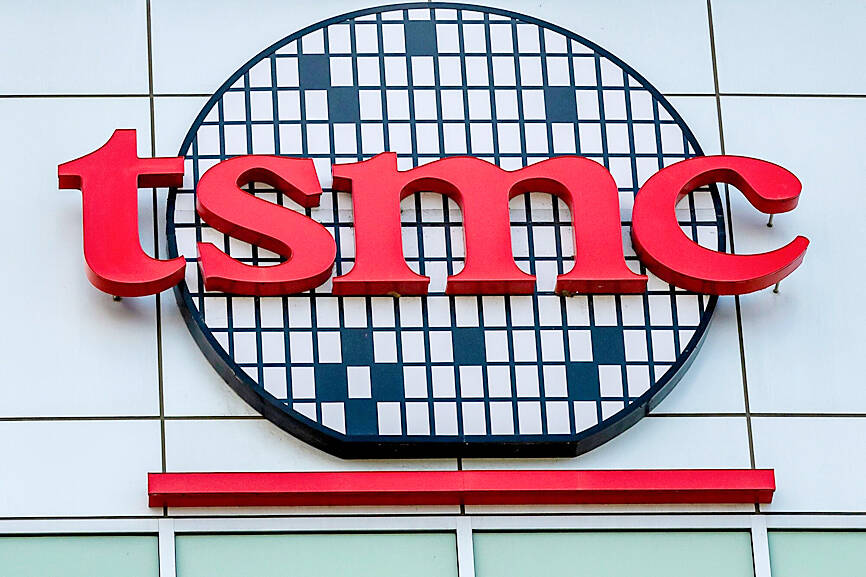Taiwan Semiconductor Manufacturing Co (TSMC, 台積電) yesterday in a statement said that it would phase out its compound semiconductor gallium nitride (GaN) business over the next two years, citing market dynamics.
The decision would not affect its financial targets announced previously, the world’s biggest contract chipmaker said.
“We are working closely with our customers to ensure a smooth transition and remain committed to meeting their needs during this period,” it said. “Our focus continues to be on delivering sustained value to our partners and the market.”

Photo: Bloomberg
TSMC’s latest move came unexpectedly, as the chipmaker had said in its annual report that it has developed second-generation 650 volt and 100 volt GaN chips, with production expected to commence this year, while it is developing an 8-inch 650 volt enhanced high-electron-mobility transistor scheduled for production next year.
GaN-based chips are emerging as an alternative to silicon-based chips in applications demanding high power efficiency, faster switch speeds and smaller form factors. The chips are used in the automotive industry, data centers and optoelectronics.
Powerchip Semiconductor Manufacturing Co (力積電) is to succeed TSMC as a supplier of high-voltage GaN chips to Navitas Semiconductor Inc, Navitas said in a statement on Tuesday.
Powerchip has reached an agreement with Navitas to produce GaN chips at its 200mm plant in Miaoli County’s Jhunan Science Park (竹南科學園區).
Powerchip is to manufacture Navitas’ GaN portfolio with ratings from 100 volts to 650 volts, supporting growing demand from hyperscale artificial intelligence data centers and electric vehicles, Navitas said.
Qualification of initial devices is expected in the fourth quarter this year and the 100 volt family is expected to start production at Powerchip in the first half of next year, while 650 volt devices would transition from TSMC to Powerchip over the next 12 to 24 months, Navitas said.
Powerchip’s fab has been operational since 2019 and supports high-volume manufacturing processes for GaN, ranging from micro-LEDs to radio frequency GaN devices, the company added.

CHIP RACE: Three years of overbroad export controls drove foreign competitors to pursue their own AI chips, and ‘cost US taxpayers billions of dollars,’ Nvidia said China has figured out the US strategy for allowing it to buy Nvidia Corp’s H200s and is rejecting the artificial intelligence (AI) chip in favor of domestically developed semiconductors, White House AI adviser David Sacks said, citing news reports. US President Donald Trump on Monday said that he would allow shipments of Nvidia’s H200 chips to China, part of an administration effort backed by Sacks to challenge Chinese tech champions such as Huawei Technologies Co (華為) by bringing US competition to their home market. On Friday, Sacks signaled that he was uncertain about whether that approach would work. “They’re rejecting our chips,” Sacks

NATIONAL SECURITY: Intel’s testing of ACM tools despite US government control ‘highlights egregious gaps in US technology protection policies,’ a former official said Chipmaker Intel Corp has tested chipmaking tools this year from a toolmaker with deep roots in China and two overseas units that were targeted by US sanctions, according to two sources with direct knowledge of the matter. Intel, which fended off calls for its CEO’s resignation from US President Donald Trump in August over his alleged ties to China, got the tools from ACM Research Inc, a Fremont, California-based producer of chipmaking equipment. Two of ACM’s units, based in Shanghai and South Korea, were among a number of firms barred last year from receiving US technology over claims they have

It is challenging to build infrastructure in much of Europe. Constrained budgets and polarized politics tend to undermine long-term projects, forcing officials to react to emergencies rather than plan for the future. Not in Austria. Today, the country is to officially open its Koralmbahn tunnel, the 5.9 billion euro (US$6.9 billion) centerpiece of a groundbreaking new railway that will eventually run from Poland’s Baltic coast to the Adriatic Sea, transforming travel within Austria and positioning the Alpine nation at the forefront of logistics in Europe. “It is Austria’s biggest socio-economic experiment in over a century,” said Eric Kirschner, an economist at Graz-based Joanneum

OPTION: Uber said it could provide higher pay for batch trips, if incentives for batching is not removed entirely, as the latter would force it to pass on the costs to consumers Uber Technologies Inc yesterday warned that proposed restrictions on batching orders and minimum wages could prompt a NT$20 delivery fee increase in Taiwan, as lower efficiency would drive up costs. Uber CEO Dara Khosrowshahi made the remarks yesterday during his visit to Taiwan. He is on a multileg trip to the region, which includes stops in South Korea and Japan. His visit coincided the release last month of the Ministry of Labor’s draft bill on the delivery sector, which aims to safeguard delivery workers’ rights and improve their welfare. The ministry set the minimum pay for local food delivery drivers at